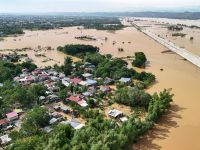Serious plan reviewing is underway within the U.S. capital for a campaign against Iraqi President Saddam Hussein.
According to the Los Angeles Times, the Bush administration expects to conclude a long-delayed Iraq policy review by the time U.S. Vice President Dick Cheney makes his 9-country Mideast visit next month, so that he can convey American plans with Arab leaders, revealed senior U.S. officials.
General sketches of favored options have begun to rise. At the core of administration policy are two strategic decisions, according to the officials.
First, the Iraqi problem must be solved, not just contained, as it was during the previous two U.S. administrations.
Second, Washington is prepared to push beyond the limitations imposed by international sentiment, Arab public opinion and the original U.N. resolutions that opened the way for Operation Desert Storm in 1991 to force Iraq out of Kuwait.
The Bush administration's view-point and the progress of the war in Afghanistan, have opened the way for re-thinking with regards to what might work with Baghdad.
Three basic scenarios are emerging:
The diplomatic route - Working via the UN to pass new "smart sanctions" and pressing Saddam Hussein's regime to permit the return of inspectors.
The military choice - Relying heavily on air force and potential defections within the Iraqi military.
The Political option - Tightening of the political circle around Saddam Hussein's government with more coercive actions by neighboring states and the international community.
The policy may well end up with a combination of these approaches. However, the common factor behind each is the threat of some kind of military action should Iraq not change its ways. Despite opposition from allies, a major U.S. military effort is no longer out of the question, U.S. officials say.
"There's an evolving consensus that a sizable U.S. military activity will be required," a source said.
Secretary of State Colin L. Powell said last week that President Bush is exploring "the most serious set of options that one might imagine" that will leave "no stone unturned."
Of the three scenarios, the diplomatic route is rapidly growing, although key U.S. officials are skeptical that it will result in a change of Iraqi regimes
However, the diplomatic route is vulnerable to failure, U.S. officials point out. To enforce smart sanctions, the United nations will have to rely on inspections on the borders of such countries as Syria, Iran, Turkey and Jordan, all of which allow Iraq to smuggle oil out in violation of U.N. sanctions in exchange for payoffs or deep discounts on the resource.
Indeed, Cheney may find that he has his work cut out for him on perhaps his most challenging diplomatic mission. Arab allies remain deeply concerned about some of the new U.S. views. "Our problem is that we see much of it as wishful thinking or a leap of faith, particularly relying on defections. This doesn't have the feel of a workable plan," said an Arab official.
Arabs are especially concerned about the post-Saddam government. "None of us are defending Saddam Hussein," the official added. "But we want to make sure that everyone is better off the day after he's gone, and that means a lot more planning than is going on now."
Iraqi Foreign Minister
Iraqi Foreign Minister Naji Sabri is scheduled to visit Turkey on Monday to participate in a joint meeting of the European Union (EU) and the Organization of the Islamic Conference in Istanbul, his ministry announced on Saturday, according to AFP.
Sabri is expected to hold discussions with Turkish officials on the sidelines of the meeting scheduled for February 12-13, the ministry added.
The Iraqi Minister's trip follows a recent call from Iraqi President Saddam Hussein on Turkey to oppose U.S. threats against Baghdad, as well as a rejection of a request from Turkey to permit international arms inspectors back into the country.
Turkish Prime Minister Bulent Ecevit had written a letter to the Iraqi leader amidst growing concerns in Ankara that Iraq would be the next target of the US-led global campaign against terrorism.
Baghdad has continuously refused to allow the return of the arms inspectors, rejecting a 1999 UN resolution to lift the sanctions if it did so.
If the Bush administration decides to attack Iraq it will almost certainly be in need of Turkey's support, just as it did in the 1991 Gulf War when U.S. jets used bases in southern Turkey to carry out bombing raids on Baghdad. (Albawaba.com)
© 2002 Al Bawaba (www.albawaba.com)







